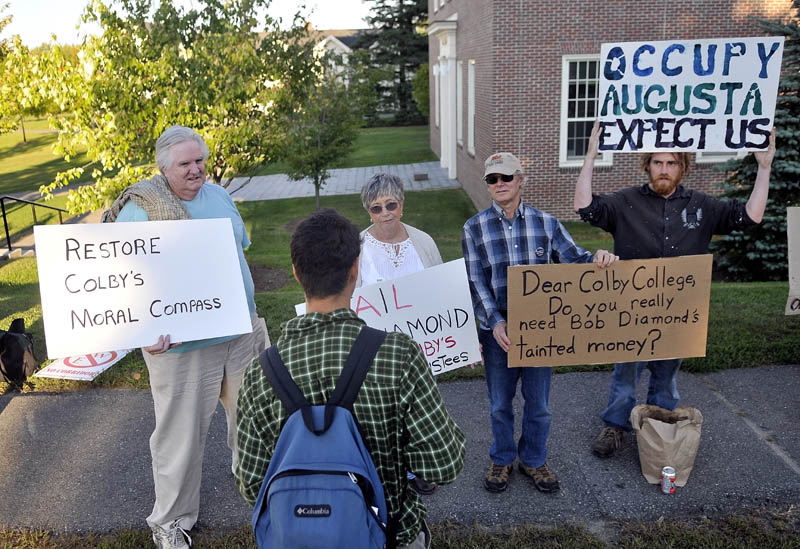WATERVILLE — Supporters of the Occupy movement reiterated their months-long grievance with Colby College on Wednesday, but the school’s administration remains unmoved.
A row of more than 20 picketers stood at the base of the Diamond Building on Mayflower Hill Drive to call attention to the building’s donor — Robert E. Diamond Jr., a 1973 Colby graduate and chairman of the college’s board of trustees. Diamond was at the center of an interest rate-fixing scandal this summer for his role as then-chief executive officer of the British bank Barclays.
The protest also served as preamble to an appearance in the Diamond Building by Todd Gitlin, professor of journalism and sociology at Columbia University’s Graduate School of Journalism. Gitlin was at the college in support of his book — “Occupy Nation,” published by It Books, an imprint of Harper Collins — but he also took the opportunity to weigh in on Colby’s continued support of its chairman.
“The great collapse of the world economy was brought about by people like Bob Diamond, who paid no penalty. I think that’s a moral shame,” he said. “It’s not an image that should be radiating before students at Colby College. I don’t think it’s exemplary.”
The college is standing behind Diamond. In August, at Diamond’s request, the Colby College Board of Trustees met in executive session to discuss the scandal. After more than two hours of discussion among more than 30 trustees, the board “strongly affirmed its support of Mr. Diamond as chair,” according an Aug. 14 news release on the college’s website.
Colby Spokesman Michael Kiser said Wednesday the school remains satisfied with the board’s position.
“We’re still confident in that process and its outcome,” he said of the August meeting.
Colby sophomore Shelby O’Neill, of Buffalo, N.Y., stopped briefly at the picket line to show support Wednesday. He said he has been following the events over the summer and wasn’t happy with the board’s response.
“I think it’s an embarrassment to Colby in many ways,” O’Neill said. “We’ve got a building on campus named for Elijah Parish Lovejoy who died for the cause of fighting slavery, then we’ve got a building named for a man who happened to give a lot of corrupt money to Colby College.”
Neill, who is pursuing majors in government and philosophy, said the issue hasn’t generated much discussion among students and hasn’t been acknowledged by faculty. He hopes that will change.
“Academia is about facing issues and not covering them up,” he said. “We should look at the message that the college is sending to the country. Is the message, ‘We will tolerate corruption as long as you give us money’? I don’t think that’s valid.”
Protest organizer Lew Kingsbury, of Pittston, studied government at Colby and graduated in 1977. He said the protest was timed to coincide with Gitlin’s appearance and the upcoming one-year anniversary of the Occupy Wall Street protests in New York City. The chief focus, however, was the board chairman.
“We’re going to keep the pressure on Colby to disassociate themselves with Bob Diamond,” he said. “He doesn’t set a good, ethical standard for the students, and we think that’s important.”
Supporters of the Occupy movement gathered at the Diamond Building once before in July, a few weeks after Diamond resigned from Barclays.
Reuters reported that several world banks were embroiled in the scandal, but Barclays is the only one to admit its traders profited from rate manipulation as far back as 2005. Barclays has been fined $453 million by U.S. and British agencies.
In mid-August, British Parliament criticized Diamond, saying he had given a “highly selective” account of the bank’s dealings, and legislators said they believed Diamond had been misled them, according to the Associated Press. Diamond denies any wrongdoing.
Diamond joined Barclays in 1996 and was on its executive committee starting in 1997. He became CEO at in early 2011.
Diamond has donated an estimated $14 million to Colby in recent years, according to a published report
Send questions/comments to the editors.



